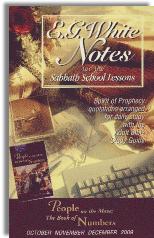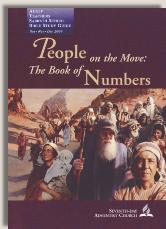|
||||||||||||||
Commentary on "The Second Generation: Admonitions"
Day 2: Sunday, December 13, 2009
Today’s lesson, titled Land Division, briefly mentions the division of the land among the various tribes of Israel.
The question is asked, “What was one of the reasons that the census was taken? Why would this be important?” According to scripture, the answer is simple; Numbers 26:54 explains, "To the larger group you shall increase their inheritance, and to the smaller group you shall diminish their inheritance.” According to this passage, Moses was to take a census so that the land could be divided up according to the size of the groups.
The lesson author states,
Once the second generation had conquered the land, it needed to be divided fairly; otherwise, this could have become a source of fighting and confusion. Fortunately, Moses was still living and could direct in this important matter. As the text states, those tribes with a lot of members were given the most land; those with fewer, less. What could be fairer than that?
The decree of God to Moses for the division of the land had nothing to do with “fairness.” Fairness is a fallen human idea of what it means to treat one another equitably. Regardless of how “fairly” the land was divided, there would be cause for fighting and confusion amongst the various tribes. The land one group receives may have a better location, nearer to a good water source, or a more heavily traveled route, leading to better opportunities for commerce.
The whole idea of fairness is one that small children are prone to get caught up in, but something we grow out of as we mature. When receiving a piece of cake at a birthday party, one child may complain that their piece is smaller than the other child’s. Some parents go to great lengths to make sure each child receives an equal measure of the good things that are being provided. This is normal for a parent. But the child must get to a point in his life where differences in what he receives from what others receive are not a source of pain, anger or resentment.
For the Christian, the idea of fairness is something that must be altogether abandoned. If Christians are concerned about “fairness” then we must become concerned with the fact that a totally innocent victim died in our place. How unfair is that?! If it is fairness that God is teaching us in his word, he has done a horrible job. The Christian message is one of unfairness, of one being treated differently than he deserves. This is true for Christ as well as for each one of us. If we truly want fairness, we must reject the Christian message and ask for swift unmerciful justice to be poured out on each one of us immediately.
The next section of today’s lesson deals with Numbers 27:1-11. This passage deals with the daughters of Zelophehad and their request for a part in the inheritance. The Lord grants this request. The lesson author states that “[a] key element here is the sanctity of the family.” This passage and the succeeding verses have nothing to do with family sanctity. It has everything to do with the sovereignty of God who is “the Lord, the God of the spirits of all flesh” (27:16) and his acts in our world.
The author then states, “The land, after all, was an ‘inheritance,’ and so it belonged in the family.” By God’s grace this land did belong to the family to which it was given. But one who feared God would always be conscious of the fact that he owned nothing and God owned everything. As the Lord said through Asaph in Psalm 50:10-11, "For every beast of the forest is Mine, the cattle on a thousand hills. I know every bird of the mountains, and everything that moves in the field is Mine.” The follower of God should not think of material property as his, but as the Lord’s. We are merely the dressers in the vineyard; we do not own the vineyard. To answer the final question of today’s lesson, one must first develop an understanding of who owns what, and what our role is in tending to those things. Only then can we come to a point where the material blessings of this world do not rule our conduct in this world.
Summary
- The Promised Land was divided according to the size of the tribes that would receive the inheritance.
- The land was not divided according to any sense of fairness.
- If we conduct our Christian life based on fairness, we must reject the Christian message. The Gospel is entirely unfair. In the Gospel message, the only righteous one is punished, while the many unrighteous are given something they do not deserve.
- Fairness is a childish concept and is rejected when one matures into adulthood.
- Family sanctity is not addressed in this passage. The Lord hears and honors a request by the daughters of Zelophehad. The family truly owns nothing. The child of God knows that the Lord owns, “the cattle on a thousand hills. [E]very bird of the mountains, and everything that moves in the field is” his.
GO TO DAY 3
Copyright 2009 BibleStudiesForAdventists.com. All rights reserved. Revised December 9, 2009. This website is published by Life Assurance Ministries, Glendale, Arizona, USA, the publisher of Proclamation! Magazine. Contact email: BibleStudiesForAdventists@gmail.com.
The Sabbath School Bible Study Guide and the corresponding E.G. White Notes are published by Pacific Press Publishing Association, which is owned and operated by the Seventh-day Adventist church. The current quarter's editions are pictured above.
Official Adventist Resources
Standard Edition Study Guide Week 12
Teacher's Edition Study Guide Week 12
Easy Reading Edition Study Guide Week 12
Search the Complete Published Ellen G. White Writings


